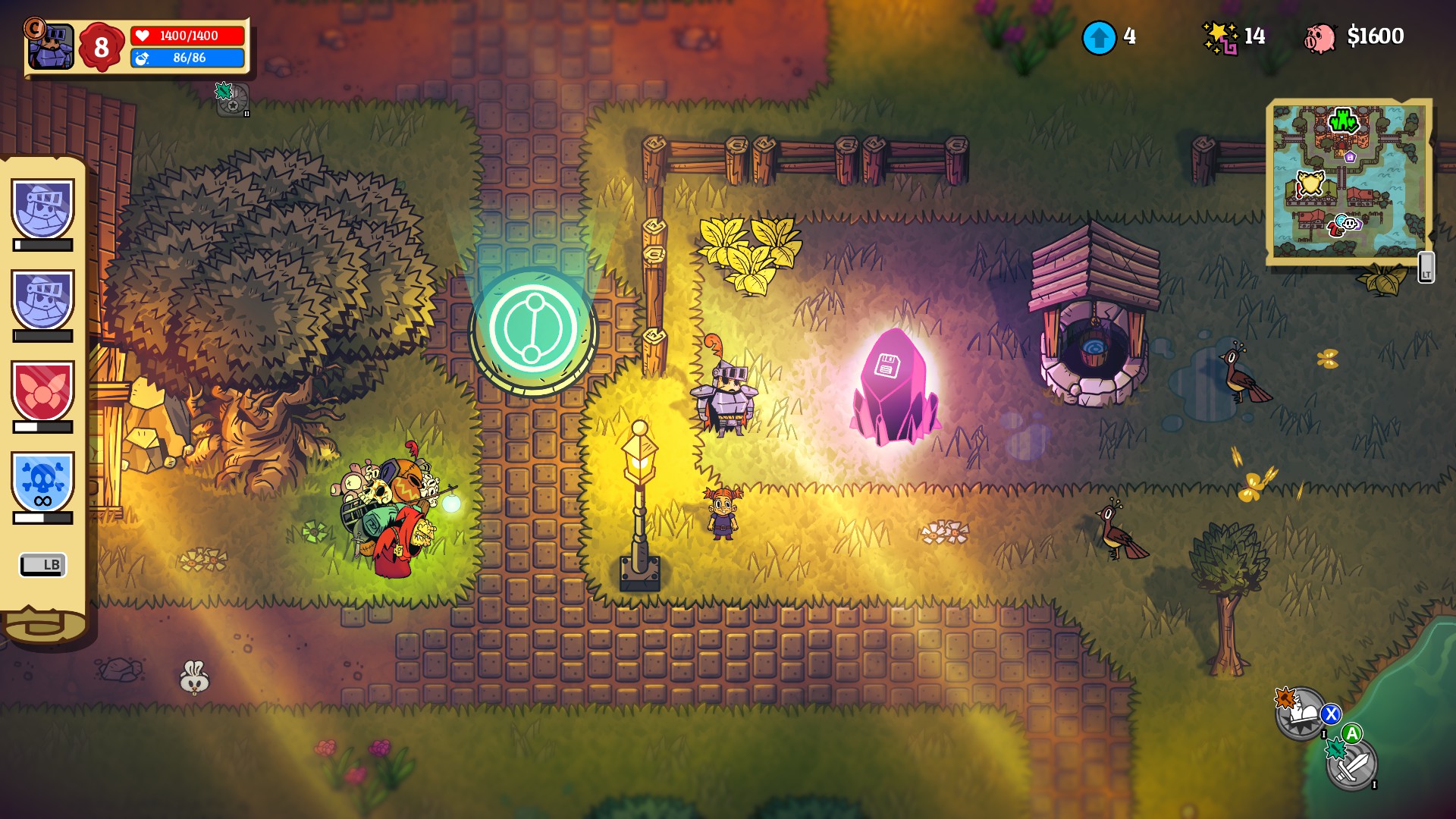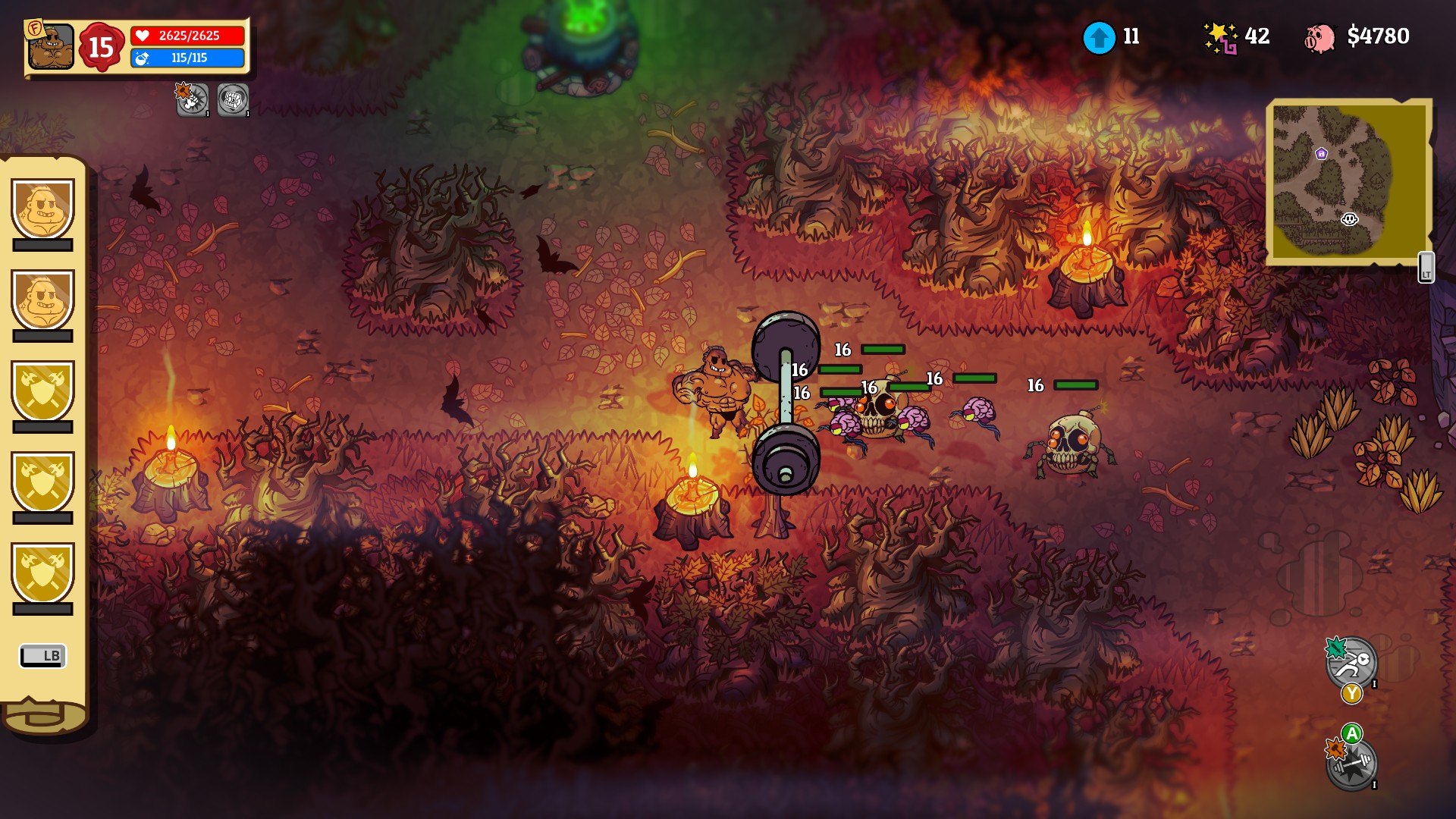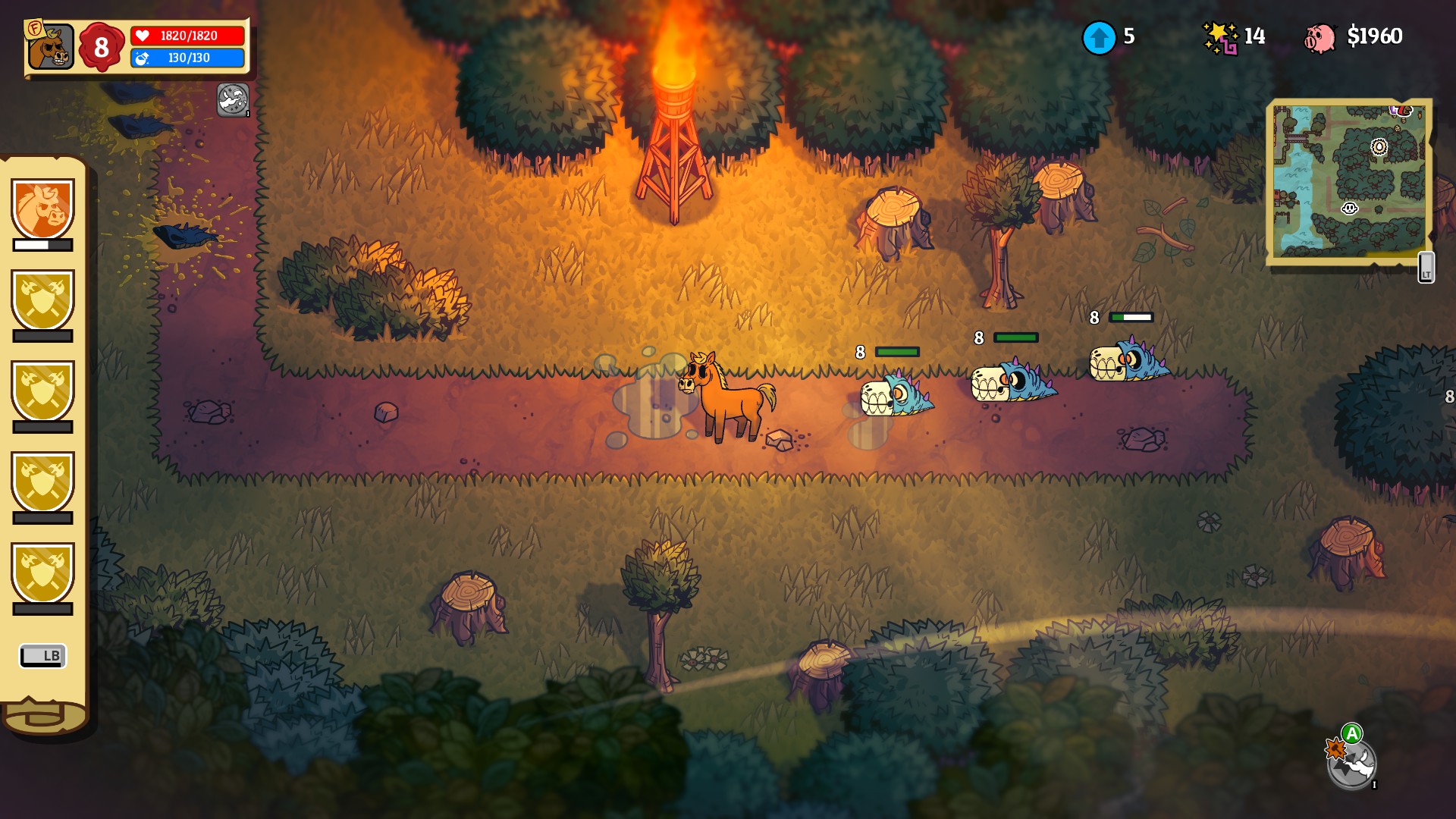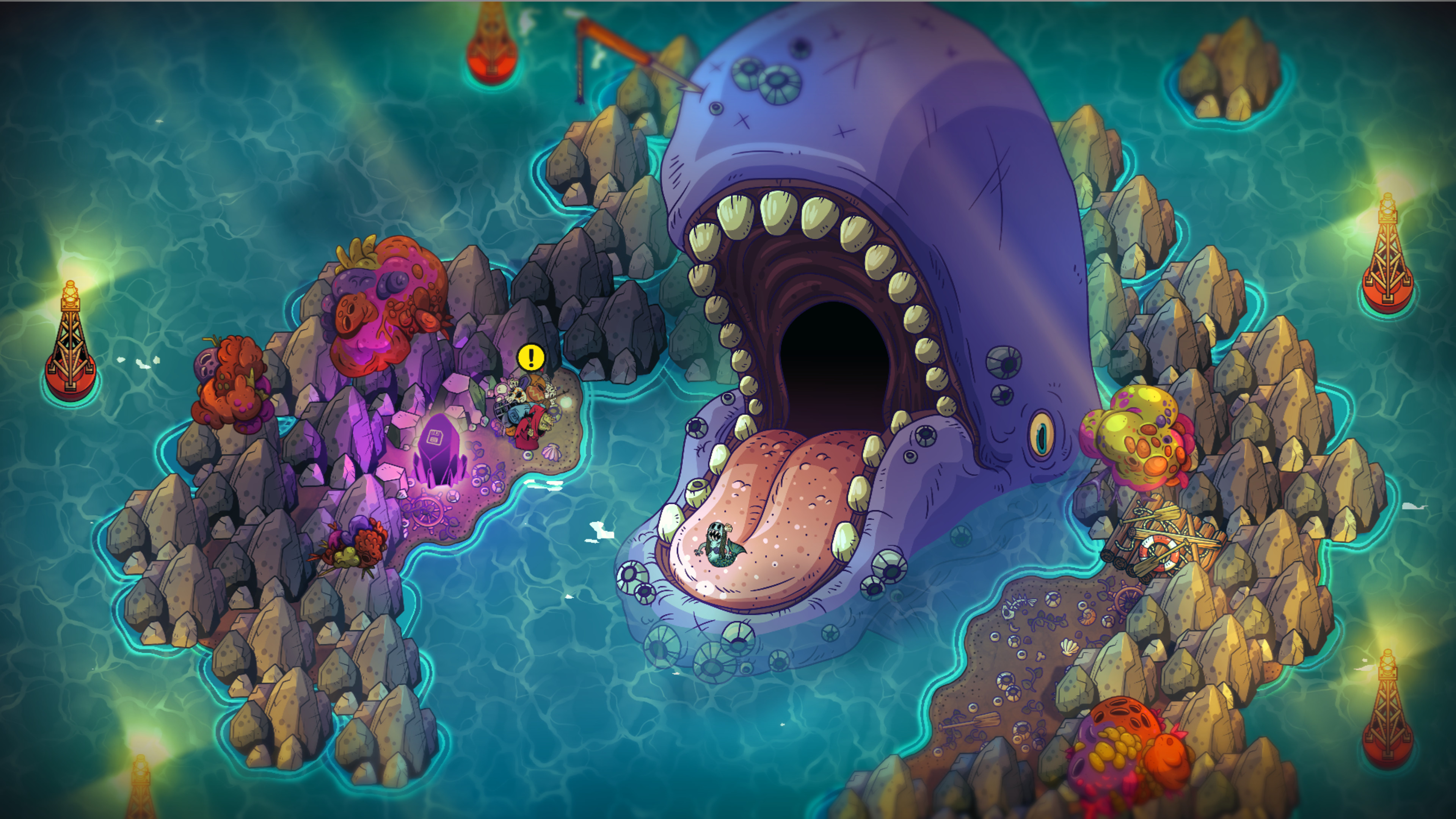Our Verdict
Nobody does it better? Not quite, but this is a highly entertaining action RPG.
PC Gamer's got your back
What is it? A tongue-in-cheek dungeon crawler with a shapeshifting hero.
Expect to pay $24.99/£19.99
Release date Out now
Developer DrinkBox Studios
Publisher DrinkBox Studios
Reviewed on RTX 2070, i7-10750H, 16GB RAM
Multiplayer? 2-player online co-op
Link Official site
Nobody Saves the World puts the grin in grind. DrinkBox's RPG isn't ashamed of its XP farming demands, and won't let you quickly mainline its story without them. But neither is it harshly traditional, withholding tasty challenges until you've eaten your greens, with only the occasional stat boosts to demonstrate the nutritional benefits. Rather, it asks: what if the grind wasn't a means to an end or an imposition, but satisfyingly playful in itself? Then shows exactly how.
Indeed, despite the game's title, saving the world feels like a distant secondary objective to simply enjoying the process. Yes, there's a story, as protagonist Nobody sets out to gather five crystal fragments that will stop a cataclysmic spread of malignant fungus. But as with DrinkBox's previous work, Guacamelee, it comes with an ironic nod to genre cliches, and nobody but Nobody is expected to take it seriously. It acknowledges countless RPGs, from the monster culls of Diablo to the gated maps of 2D Legends of Zelda, with cheesy jokes and a vibrant cartoon style full of chaotic edges and bug-eyed characters, like Stardew Valley via Spongebob, that make it clear you're in the land of the silly.

And the silliness is infectious because of the main character's pliability. Nobody is a plain white cardboard cut-out of a human with amnesia—an actual blank canvas with no abilities to call their own, except the most apathetic slap you've ever seen. But just as this is a game about the journey more than the destination, it's also about what you become along the way—quite literally. With the aid of a magic wand, Nobody can transform at will into a host of animals, mythical beasts and vocations, calling on their unique skills to beat back the monster hordes.
Horsepower
Unlocking new forms (18 in total) and toying with their individual quirks sits at the heart of Nobody Saves the World. There's something wonderfully absurd, for example, about assuming the persona of a cabaret magician in a fantasy world where wizards and magic palpably exist, yanking aggressive bunnies from a top hat. I also enjoy running around backwards as a horse (you can hold down a button to fix the direction you're facing), because its main attack is a two-hooved boot from the rear. And I never thought I'd say this, but I'm a big fan of the slug, backpedalling from enemies to draw them into its slimy trail, slowing them down to be picked off with watery projectiles.
Each form begins with a unique signature attack and passive ability, and eventually learns one or two rechargeable special moves—the horse gets a charging gallop, for instance. But the real fun begins once you can mix and match abilities from different forms in an open-ended system that reminded me a little of Transistor, with a similar onus on freeform experimentation. So, you might equip the rat's poison buff on the horse, adding real venom to those kicks. Or maybe you want a turtle that can sneak up and backstab foes like a thief in the night, or give your slow-moving bodybuilder the ability to gallop.

Crucially, all these possibilities are used to ensure that the grind of chewing through monsters is never merely about watching XP bars fill. All levelling up in Nobody Saves the World is tied to quests, which include completing dungeons or errands provided by NPCs, but also a series of objectives linked to each form's abilities. The most basic of these involve hitting a certain number of enemies with a form's regular attacks, but they quickly evolve to demand you master the nuances of your powers or stack them in specific ways. And since you can't enter critical path dungeons until you've completed plenty of smaller quests, you have to keep trying different techniques as you tour the land smiting critters.
With that, I found I rarely focused on where I was going, and was content wandering the map, mucking about with the range of skills at my disposal, side-tracked by tasks such as slaughtering another dozen enemies using the rat's health-regenerating bite attack while playing as a zombie. Still, the overworld is well worth exploring, tightly plotted with connecting passageways, open fields, lakes and underground tunnels, and stuffed with monsters, treasure, settlements and amusing distractions. I met a slug who wanted me to bring his wife back from the dead, for example, while a speedy wizard loiters near a makeshift racetrack waiting for challengers. These are great because, again, they ask you to think up a combination of powers to get the job done.
Dungeon rules
There are also plenty of dungeons to crawl through, and these add extra bite to combat by introducing wards and location-specific rule changes. The former carry over from Guacamelee, whereby you can't damage an enemy until you break its shield with a certain kind of attack (blunt, sharp, light, dark). The latter create awkward wrinkles such as increased enemy damage or healing items that heal monsters as well as yourself. Few are major challenges, but they force you to consider your form and tactics, not least because you're booted back to the start if you die before the boss door.

Despite all this variety, however, I do think Nobody Saves the World is spread a little thin over its 20-hour run-time, and that's mainly down to the dungeons. While their themes and décor are certainly imaginative, from the horse mines, littered with horseshoes and giant carrots, to an alien spaceship and the inside of a dead dragon, in practice they're quite similar—a series of procedurally generated monster mazes, with the occasional trap to dodge, lasting a steady 15-20 minutes. I would have been happy with fewer of them if each had more distinctive diversions and offered more contrast to the pace of outdoor exploration. At the very least it would have been good if there were some strategic boss encounters to top them off, rather than enlarged versions of regular enemies surrounded by minions.
The enclosed conditions within dungeons also tend make the generally slick and consistent combat feel more haphazard. It comfortably manages to accommodate dozens of monsters and familiars smashing into each other at once, but there's no real sense of impact between the paper cut-out characters, and hits don't visibly register other than the little numbers that pop up, so when it turns into something of a mosh pit, it's difficult to gauge who's winning. Death can be alarmingly sudden when you're surrounded by mobs protected by wards you can't instantly shatter, or if you simply lose yourself amid the chaos.
If it's a bit flabby and messy, though, Nobody Saves the World is far more often a delight. Guacamelee was a showcase for ingenious level design, but here DrinkBox demonstrates a different knack for layering up complex systems, which combine and play off each other in deviously logical ways. Under the brash exterior lies a wonderfully technical game that offers the freedom to let you discover the quality of its craft in your own time. Grinding through quests is a genuine pleasure and, well, who doesn't want to be a horse with the powers of a slug?
Nobody does it better? Not quite, but this is a highly entertaining action RPG.

